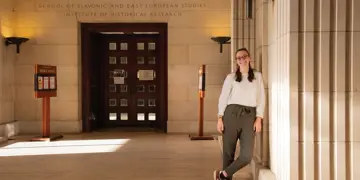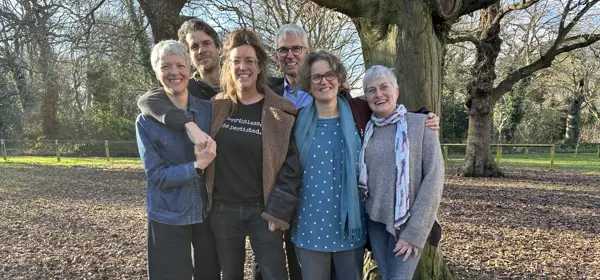Hear my concerns
Hear my concerns
Deafness is a common condition but it can feel like society’s ‘best kept secret’, says deaf doctor Natasha Wilcock. She tells Tim Tonkin about discrimination, the particular challenges of the pandemic, and working in a specialty where communication skills are key
Deafness is thought to affect one in five adults in the UK, with this figure rising to 70 per cent of those aged above 70.
Despite its prevalence, deaf doctor Natasha Wilcock says awareness and understanding of the challenges deafness poses in society at large and in the health service and medical profession, sometimes feels like it is the ‘best kept secret in the world’.
From before she had even entered medical school, to her time as a student and now as a doctor working in palliative care, Dr Wilcock has spent years overcoming obstacles and challenging misconceptions about what it is to be a deaf medical professional.
‘I think that there are a lot of attitudes prevailing in society that deaf people are less intelligent or can’t do very academic jobs like being a doctor, which are of course completely untrue,’ explains Dr Wilcock.
‘Growing up, a lot of people told me that I couldn’t do it, that they had never known a deaf doctor. They would say, “how are you going to put stethoscope in your ear? You have hearing aids”.
‘[Even after qualifying] I have had consultants saying to me “how did you get into med school?”
I had maybe one or two sentences about deafness in a six-year degree
Dr Wilcock
Like most doctors, Dr Wilcock wanted to pursue a career in medicine from an early age, inspired by the idea of combining scientific knowledge with interpersonal skills to make people’s lives better.
From the very beginning, however, she faced opposition and even behaviour that many would view as discriminatory.
After being told by her college to contact each UK medical school individually to ask if they would, in principle, accept a deaf medical student, Dr Wilcock recalls how an evaluation one school required her to undertake made her seriously question whether medicine was for her.
‘They asked me to do a test where I basically had to take my hearing aids out and face away from the examiner who then spoke a series of words that I had to repeat back. Obviously, I couldn’t do that. It’s like asking somebody to read something without their glasses on,’ recalls Dr Wilcock.
‘I know from current medical students’ experiences that a lot of deaf people are [still] facing a lot of difficult, inequitable, inaccessible experiences in medical schools.’
Training deficit
Based on her own experience, Dr Wilcock believes much of the ignorance surrounding deafness in her profession and healthcare settings stems from an inadequate amount of time dedicated to the subject during medical training.
‘I had maybe one or two sentences [about deafness] in a six-year degree. Whereas you might have a weeklong lecture series about a really rare, niche condition that you might see one presentation of, or never, during your whole career.’
It was this dearth of awareness and training, along with her own experiences as a patient, that led Dr Wilcock, as a student, to initiate ad hoc deaf awareness teaching at her own medical school at UCL, before ultimately going on to set-up IDA Training.
As an organisation, IDA seeks to improve doctors and other healthcare professionals’ knowledge and confidence when interacting with deaf patients or colleagues.
‘I think there’s often an assumption that deaf people just put their hearing aids or cochlear implants in, and then just go about their day,’ explains Dr Wilcock.
‘Even if you’ve got your hearing aids in still, your sound experience won’t be the same as hearing people. You might be using lip reading or speech reading, and that’s really tiring and not very accurate. Deafness is part of a person’s identity and affects all parts of their lives.’
There’s often an assumption that deaf people just put their hearing aids or cochlear implants in, and then just go about their day
Dr Wilcock
The daily communication challenges faced by deaf people was remorselessly brought to the fore during the pandemic and the widespread use of facemasks and other personal protective equipment, particularly in healthcare settings.
Still a final-year medical student when COVID-19 struck, Dr Wilcock campaigned vigorously for her workplaces and other trusts to adopt clear face masks to improve communication for deaf patients and staff.
While her efforts were often rejected, often on the grounds of cost, Dr Wilcock said that, in some ways, the pandemic years have inadvertently helped to advance awareness within the health service of the difficulties faced by many deaf individuals.
‘I think a lot of hearing people during COVID realised actually how difficult communication was for deaf people,’ she says.
‘A lot of people started to think about more flexibility in communication, such as holding lectures or meetings on Microsoft Teams that has an inbuilt live captioning software.’
Useful insight
Outside of her work with IDA, Dr Wilcock’s clinical career is centred in palliative care in an inpatient hospice setting, a specialty that, by its very nature, requires clear and effective yet compassionate communication and understanding.
It is also an area of medicine in which Dr Wilcock’s lived experience has provided her with enormously important insights.
Deafness is commonly encountered among patients in end-of-life care settings either because of age-related hearing loss or being secondary to a variety of illnesses including cancer and conditions affecting the brain or spine.
‘Palliative care communication is often very sensitive, very emotive and also needs to be very accurate because the most important thing for us as doctors is making sure that we are meeting the patient’s wishes,’ explains Dr Wilcock.
‘Deafness is very common, but very often deaf people can be missed out in the conversation about their own death and dying process, because people haven’t thought to support their communication well enough.
Contrary to popular belief, Dr Wilcock says British Sign Language is a rich and highly expressive form of communication but admits signing specialised palliative-care terms such as ‘hospice’ can present challenges.
Added to this is the frequent lack of access to sign-language interpreters for patients and staff, something which is as much an issue in the wider health service as it is in palliative care.
‘At the end of life, you want to be able to make sure someone is having the sort of communication they want,’ Dr Wilcock explains.
‘For example, clarifying with someone that, if and when they can no longer communicate for themselves, would they like their hearing aids to remain in so that you can appreciate the conversation going on around them, or whether they would like them removed so that they can be really quiet and peaceful?’
While still at a very early stage in her medical career, Dr Wilcock is already able to look back on a number of important, and continuing, contributions to her profession.
She says that, while her experiences have left her with mixed feelings as to what it means to be a deaf doctor in the NHS, overall she recognises the critical importance of deaf people being visible in medicine.
‘I think that being a deaf doctor is an amazing thing and I think you can have a really big positive impact on your patients and on the health service,’ she says.
‘I don’t think it is something that you should go into lightly, because it will be hard, but having visibility of deaf doctors is important, in part because it serves a basic purpose of helping people to recognise deaf people can be doctors.
‘I think it is also a really big deal that deaf patients can see themselves in their doctors and their healthcare staff.’



